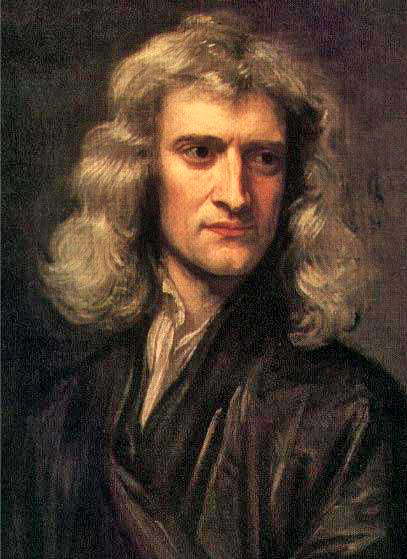Isaac Newton nejznámější citáty
Isaac Newton: Citáty o čase
Isaac Newton citáty a výroky

„Platón je můj přítel - Aristoteles je můj přítel - ale můj největší přítel je pravda.“
Amicus Plato — amicus Aristoteles — magis amica veritas
„Bůh stvořil vše podle čísla, váhy a míry.“
Numero pondere et mensura Deus omnia condidit.
„V Bibli existuje více důkazů autentičnosti, než bychom nalezli v jakýchkoli světských dějinách.“
Originál: (en) I find more sure marks of authenticity in the Bible than in any profane history whatsoever.
Zdroj: [Christie, Thomas, 1794, The Analytical Review, Or History of Literature, Domestic and Foreign, on an Enlarged Plan, Svazek 19, 491, angličtina]
„Dokážu spočítat pohyb nebeských těl, ale ne šílenství lidí.“
Originál: (en) I can calculate the motion of heavenly bodies, but not the madness of people.
Isaac Newton: Citáty anglicky
“Truth is ever to be found in simplicity, and not in the multiplicity and confusion of things.”
Cited in Rules for methodizing the Apocalypse, Rule 9, from a manuscript published in The Religion of Isaac Newton (1974) by Frank E. Manuel, p. 120, as quoted in Socinianism And Arminianism : Antitrinitarians, Calvinists, And Cultural Exchange in Seventeenth-Century Europe (2005) by Martin Mulsow, Jan Rohls, p. 273.
As quoted in God in the Equation : How Einstein Transformed Religion (2002) by Corey S. Powell, p. 29
Varianta: Truth is ever to be found in the simplicity, and not in the multiplicity and confusion of things.
Philosophiae Naturalis Principia Mathematica (1687), Scholium Generale (1713; 1726)
Zdroj: The Principia: Mathematical Principles of Natural Philosophy
Kontext: This most beautiful System of the Sun, Planets and Comets, could only proceed from the counsel and dominion of an intelligent and powerful being. And if the fixed Stars are the centers of other like systems, these being form'd by the like wise counsel, must be all subject to the dominion of One; especially, since the light of the fixed Stars is of the same nature with the light of the Sun, and from every system light passes into all the other systems. And lest the systems of the fixed Stars should, by their gravity, fall on each other mutually, he hath placed those Systems at immense distances one from another.
“To every action there is always opposed an equal reaction”
Laws of Motion, III
Philosophiae Naturalis Principia Mathematica (1687)
Kontext: To every action there is always opposed an equal reaction; or, the mutual actions of two bodies upon each other are always equal, and directed to contrary parts.
“Tact is the knack of making a point without making an enemy.”
Actually a statement by American advertising executive and author Howard W. Newton (1903–1951); attributions to Isaac are relatively recent, those to Howard date at least to Sylva Vol. 1-3 (1945), p. 57 https://books.google.com/books?id=-QUcAQAAMAAJ&q=%22Tact+is+the+knack+of+making+a+point+without+making+an+enemy%22&dq=%22Tact+is+the+knack+of+making+a+point+without+making+an+enemy%22&hl=en&sa=X&ei=jtmwVJrZN43ksATPmID4BA&ved=0CNkBEOgBMCQ, where it is cited to an earlier publication in Redbook.
Misattributed
Varianta: Tact is the art of making a point without making an enemy.
Varianta: Tact is the knack of making a point without making an enemy.
Statement from unpublished notes for the Preface to Opticks (1704) quoted in Never at Rest: A Biography of Isaac Newton (1983) by Richard S. Westfall, p. 643
“Whence arises all that order and beauty we see in the world?”
Zdroj: Opticks
“If I have seen further than others, it is by standing upon the shoulders of giants.”
Letter to Robert Hooke (15 February 1676) [dated as 5 February 1675 using the Julian calendar with March 25th rather than January 1st as New Years Day, equivalent to 15 February 1676 by Gregorian reckonings.] A facsimile of the original is online at The digital Library https://digitallibrary.hsp.org/index.php/Detail/objects/9792. The quotation is 7-8 lines up from the bottom of the first page. The phrase is most famous as an expression of Newton's but he was using a metaphor which in its earliest known form was attributed to Bernard of Chartres by John of Salisbury: Bernard of Chartres used to say that we [the Moderns] are like dwarves perched on the shoulders of giants [the Ancients], and thus we are able to see more and farther than the latter. And this is not at all because of the acuteness of our sight or the stature of our body, but because we are carried aloft and elevated by the magnitude of the giants. Modernized variants: If I have seen further it is by standing on the shoulders of giants. If I have seen further it is only by standing on the shoulders of giants.
Varianta: If I have seen further it is by standing on ye sholders of Giants.
Zdroj: The Correspondence Of Isaac Newton
Drafts on the history of the Church (Section 3). Yahuda Ms. 15.3, National Library of Israel, Jerusalem, Israel. 2006 Online Version at Newton Project http://www.newtonproject.sussex.ac.uk/view/texts/normalized/THEM00220
Query 18
Opticks (1704)
xxiv. 15.
Vol. I, Ch. 10: Of the Prophecy of the Seventy Weeks
Observations upon the Prophecies of Daniel, and the Apocalypse of St. John (1733)
As quoted by Frank Edward Manuel, The Religion of Isaac Newton (1977)
Letter to Edmund Halley (June 20, 1686) quoted in I. Bernard Cohen and George E. Smith, ed.s, The Cambridge Companion to Newton (2002) p. 204
Written in remarks to the 1714 Longitude committee; quoted in Longitude (1995) by Dava Sobel, p. 52 (i998 edition) ISBN 1-85702-571-7)
Board of Longitude
Query 2
Opticks (1704)
Vol. I, Ch. 12: Of the Prophecy of the Scripture of Truth
Observations upon the Prophecies of Daniel, and the Apocalypse of St. John (1733)
Query 30 : Are not gross bodies and light convertible into one another, and may not bodies receive much of their activity from the particles of light which enter into their composition?
Opticks (1704)
Letter to Josiah Burchett (1721), quoted in Longitude (1995) by Dava Sobel, p. 60
Board of Longitude

